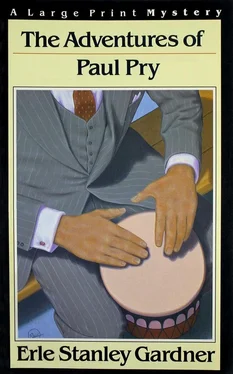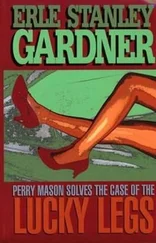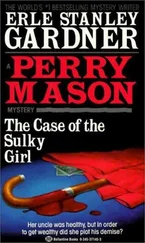Paul Pry mixed up the drink, taking care to make far more soda water in its content than gin, and returned to the room, the ice clinking in the glass.
The woman had flung herself on the sofa. The negligee had fallen back from her raised bare arm which held a cigarette in a long jade and ivory holder. She was staring at Paul Pry.
“That message,” she said, “was from a widowed sister. Her child’s sick, and she wants me to come out and stay with her tonight. I hate the thought of nursing a sick child.”
“And of telling her of the brother who was taken for a ride?” he asked.
“I shan’t tell her!” snapped the figure on the couch.
“I see,” he muttered, noncommittally.
“You would,” she flared.
Paul Pry shot her a swifter glance. The face was as fierce as that of a tigress, and it softened instantly into a smile of invitation.
“But I want to thank you — properly, when I have the opportunity, for saving my life. When can I see you?”
“Any time.”
“Well. I’ve had a minute of relaxation, and that’s enough. I’ll pack my suitcase, and get started. Tell you what — you got any friends in the city?”
The tone was anxious.
“Not a friend,” said Paul Pry.
Paul Pry hesitated for an appreciable fraction of a second.
A swift smile darted about her lips.
“Oh, I know,” she said. “You don’t need to explain. Listen, maybe you can do something else for me. Go to the Billington Hotel and register under the name of George Inman, will you? You don’t need to stay there, just take a room so you’ll be registered, and so you can get mail there. If you’ll do that, I’ll drop you a note as soon as the child gets well.”
“O.K.,” said Paul Pry, his face lightening. “That’ll be a swell idea. George Inman, eh?”
“George Inman,” she said.
The woman kicked off the folds of the negligee, and the result was rather startling.
“And get out of here, so I can get into some street clothes. I’ll drop you a note.”
Paul Pry finished his drink, reached for the doorknob.
“I’ll be seeing you,” she said.
“Toodle-loo,” remarked Paul Pry after the manner of a male who has been utterly hypnotized.
“Cheerio,” she cooed as the door closed.
Paul Pry, in the corridor, became swiftly cautious. He didn’t go down the back stairs, the way he had come, but went to the front of the building, found an automatic elevator, entered the cage and pressed the button which took him to the lobby. He walked out, past a desk where a coloured lad in a brilliant uniform sat at a telephone switchboard, and out onto the lighted street.
He walked a few steps, retraced his steps and looked at the index over the mail boxes.
The woman’s name was the same as that on the letter. Lola Beeker.
Paul Pry called a cab.
The address that he gave was within half a block from the place he had been standing when the woman had debouched from the car, a vision in white.
He discharged the cab, paid the meter, and stubbed his toe as he turned back to the sidewalk. He tried to get up, but sank back with a groan. The cab driver, suddenly solicitous, jumped from the cab, came toward him.
“What is it, boss?”
“I don’t know,” said Paul Pry. “Something happened in my leg, a nerve or something. I can’t move it.”
The taxi driver straightened, peered up and down the side street.
“There’s a doctor over there, about seventy-five feet or so. Think you can make it?”
Paul Pry groaned, nodded.
“I’ll try,” he said.
A passer-by, attracted by the sprawled figure, came cautiously over. The cab driver explained. Between them, they got Paul Pry to his feet and took him along the pavement to the flat where a sign announced that Philip G Manwright, MD, held office hours from two to five in the afternoon on every day except Sunday.
The cab driver pressed the bell.
After some two or three tries, there sounded motion from within the house, and feet thudded along the corridor which led to the door. A light clicked on, and a man in bathrobe with hair that was mussed up and eyes that were slightly swollen with sleep, regarded them in dour appraisal.
“Doctor?” asked the cab driver.
The man nodded.
“This guy did a Brode an’ busted a leg or somethin’ right out in front of the joint,” said the driver.
“Come in,” invited Doctor Manwright.
They shuffled along the corridor, into a surgical room where an operating table occupied the centre of the floor under a droplight.
“Put him down there,” said the doctor.
They stretched Paul Pry out on the table.
“Which leg?” asked the doctor.
“Right.”
He passed exploring fingers over it.
“Something seemed to happen and all the strength went out of it. It’s pricking like pins and needles now,” said Paul Pry.
The doctor frowned, flexed the leg.
“Humph.”
The cab driver grinned cheerfully at Paul Pry.
“Well,” he said, “I’ll run along.”
“Better drive the cab up and wait,” said Paul Pry.
“O.K., boss.”
The two men ambled awkwardly out of the room. The doctor drew the bathrobe about him and regarded Paul Pry speculatively.
“Any peculiar feeling about the heart?” he asked.
“None,” said Paul Pry.
“Notice any sudden pain just above the leg when it gave out?”
“None.”
“Nervous?”
“Very. I can’t sleep. I got all sorts of strange symptoms.”
The doctor felt the leg again.
“I’ll go get some clothes on,” he announced, “and we’ll give you a once-over.”
“Sorry to bother you,” said Paul Pry. “I’m feeling better now. The circulation seems to be coming back.”
“In any pain?” asked the doctor.
“Just the pins and needles.”
The doctor crossed to a cabinet, took out a bottle, poured a few drops into a glass of water.
“Drink this,” he said. “I’ll dress and come in again. I won’t be three minutes.”
“O.K.,” said Paul Pry and sipped at the glass.
The doctor left the room.
Paul Pry got up and dumped the mixture down the sink, crossed on swift, silent feet into the office which was next to the surgical room, and stared at the flat-topped desk, the bookcase, the card index of files.
He opened the files. The light which came from the surgical room enabled him to pick out the letters of the index. He consulted the “B’s” and pulled out a card marked “Beeker, Laura.”
Then Paul Pry noticed a day book on the desk. He opened it and consulted the current date. It appeared that, between eleven and twelve, Doctor Manwright had treated a gentleman who gave the name of Frank Jamison.
Paul Pry went to the card index, and pocketed the card of Frank Jamison. Then he went back to the surgical room and stretched out on the operating table, closing his eyes and breathing regularly.
The doctor came into the room within a few minutes, looking gravely professional. The depression had undoubtedly hit the medical business, and Paul Pry felt certain that the doctor would at least lay a foundation for a stiff charge for a night visit.
Nor was he wrong. For twenty minutes the doctor examined him. At the end of that time, there was doubt and a certain suspicion in the doctor’s eyes.
“You’d better come back tomorrow afternoon. What’s the name?”
“George Inman.”
“Where do you live?”
“Billington Hotel.”
“Age?”
“Twenty-six.”
“Ever had any heart trouble, dizzy spells, rheumatism?”
Paul Pry nodded gloomily.
“I feel dizzy every once in a while,” he said, “and I used to have rheumatism in my right shoulder.”
Читать дальше












